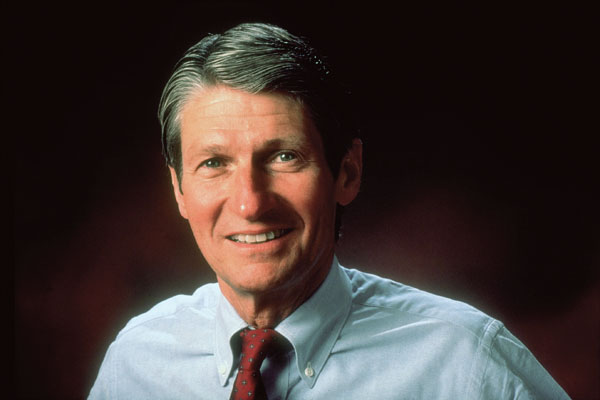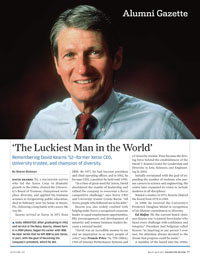Alumni Gazette
 GOAL-ORIENTED: After graduating in 1952 and service in the Navy, Kearns, shown here in a 1989 photo, began his career with IBM. He later wrote that he left IBM to join Xerox, in part, with the goal of becoming the company’s president, which he did. (Photo: Getty/Time-Life)
GOAL-ORIENTED: After graduating in 1952 and service in the Navy, Kearns, shown here in a 1989 photo, began his career with IBM. He later wrote that he left IBM to join Xerox, in part, with the goal of becoming the company’s president, which he did. (Photo: Getty/Time-Life)David Kearns ’52, a Rochester native who led the Xerox Corp. to dramatic growth in the 1980s, chaired the University’s Board of Trustees, championed workplace diversity, and applied his business acumen to invigorating public education, died in February near his home in Stuart, Fla., following a long battle with cancer. He was 80.
Kearns arrived at Xerox in 1971 from IBM. By 1977, he had become president and chief operating officer, and in 1982, he became CEO, a position he held until 1990. “In a time of great need for Xerox, David shouldered the mantle of leadership and rallied the company to overcome a fierce competitive challenge,” says Xerox CEO and University trustee Ursula Burns. “All Xerox people who followed are in his debt.”
Kearns was also widely credited with helping make Xerox a recognized corporate leader in equal employment opportunities. His encouragement and development of minority and women business leaders became a national model.
“David was an incredible mentor to me and an inspiration to so many people of color,” says Francis Price ’74, ’75S (MBA), CEO of Interact Performance Systems and a University trustee. Price became the driving force behind the establishment of the David T. Kearns Center for Leadership and Diversity in Arts, Sciences, and Engineering in 2002.
Initially envisioned with the goal of expanding the number of students who pursue careers in science and engineering, the center later expanded its vision to include students in all disciplines.
Named a trustee in 1972, Kearns chaired the board from 1978 to 1985.
In 2008, he received the University’s Frederick Douglass Medal in recognition of his lifetime commitment to diversity.
Ed Hajim ’58, the current board chair, says Kearns was “a natural-born leader who faced every challenge with confidence and integrity.” President Joel Seligman called Kearns “as inspiring as any person I ever met, his attention always devoted to the dream that progress could be made.”
A member of the board into the 1990s, Kearns took a break only to serve as deputy secretary of education in the administration of former president George H. W. Bush.
Kearns’s travels and speeches built the case for improved public schools to help meet the needs of business and strengthen America’s global competitiveness.
He remained an outspoken advocate for innovation, school-based autonomy, competition and choice in education, founding the nonprofit New American Schools to promote reform.
From 1993 to 1995, he was a senior university fellow at the Harvard Graduate School of Education.
Known for his exuberance and energy, Kearns also took time to reflect and document his ideas as an author or coauthor of Winning the Brain Race: A Bold Plan to Make Our Schools Competitive with Denis P. Doyle (1988); Prophets in the Dark: How Xerox Reinvented Itself and Beat Back the Japanese with David A. Nadler (1992); Legacy of Learning: Your Stake in Standards and New Kinds of Public Schools with James Harvey (2000); and Crossing the Bridge: Family, Business, Education, Cancer, and the Lessons Learned (2005).
After graduation, he became a U.S. Navy seaman, and in 1954 joined IBM, eventually becoming vice president of its data processing division. Years later, Kearns wrote in his memoirs that he left IBM, in part, because he wanted to become president of Xerox—which he did.
Kearns was married for 56 years to Shirley Cox Kearns. Together they raised six children—four daughters and two sons—and Kearns leaves behind 18 grandchildren.
In a statement, the family said:
“Among his prolific accomplishments in business, education, and public service, David found the most success and pleasure in his role as a loving husband, devoted father and grandfather, mentor, and friend.
“David demonstrated inspiring perseverance as he confronted the challenges of his ongoing health problems. One of his greatest legacies to all who came in contact with him was his interminably cheerful spirit and the grace and dignity with which he led his life.
“Despite his daily physical struggles, David was grateful for all the blessings in his life, and often referred to himself as ‘the luckiest man in the world.’ ”
Sharon Dickman is University spokeswoman.

